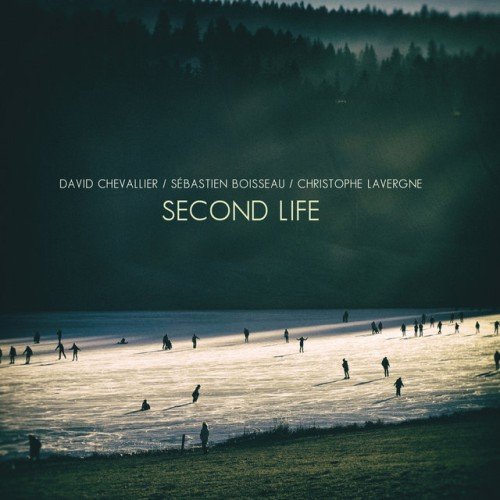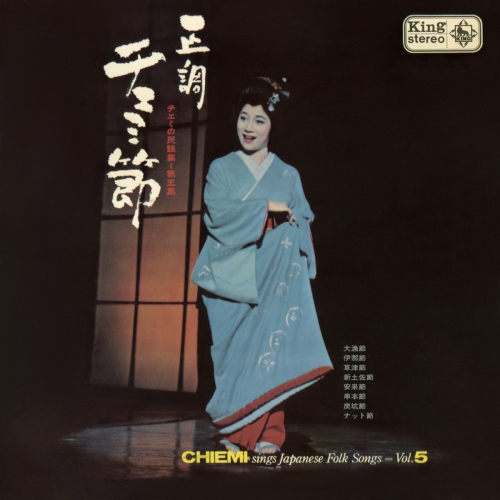VA - Tchaikovsky Edition (2011)
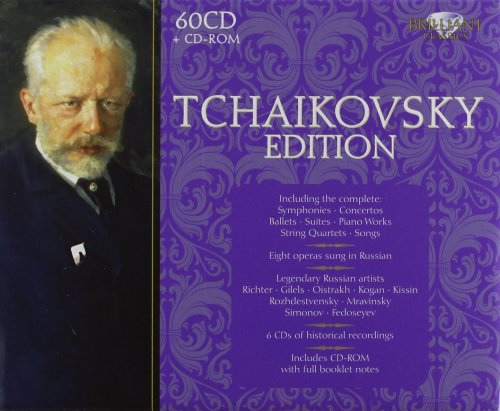
Artist: Various Artists
Title: Tchaikovsky Edition
Year Of Release: 2011
Label: Brilliant Classics
Genre: Classical
Quality: FLAC (image + .cue, log, artwork)
Total Time: 2d 18:52:43
Total Size: 14.99 GB
WebSite: Album Preview
Title: Tchaikovsky Edition
Year Of Release: 2011
Label: Brilliant Classics
Genre: Classical
Quality: FLAC (image + .cue, log, artwork)
Total Time: 2d 18:52:43
Total Size: 14.99 GB
WebSite: Album Preview
This, I must admit, is more of an overview than a review. There's more detail in my survey of Brilliant's 60-CD set issued in 2011; even that was in the nature of a skim and I am recycling and summarising some of the overlapping material. The 60-CD set and the present one range over many of the same recordings but there are differences. For a start this one does not have a CD-ROM of notes and librettos. The present box has a 14-page essay by David Nice: well done Brilliant for not making false economies there. The 'missing' CDs are the five comprising historical recordings.
The symphonies - seven of them - are the same as in the 2011 set. For the most popular core symphonies (4-6) we are in the hands of Rozhdestvensky in 1987 with the LSO. They are in glorious form apart from the Andante of No. 4 which is unfeelingly quick. Tangy fillers come in the shape of Marche Slave, Capriccio Italien and The Storm. There's no sign of Tempest.
The Symphonies 1 and 3 are from a Vladimir Fedoseyev cycle. His fine Third is in harness with a tragically cloud-hung and angry Hamlet in thunderously affirmative sound. Yuri Simonov is in charge for Symphony No 2, Francesca (CD3) and Manfred. These are very good though not quite in the exultant Bernstein (CBS-Sony) vein. Technically, however, these recordings are exemplary - far superior to Bernstein’s CBS analogue.
Simonov favours a broad and steady stride in Francesca. He is gloriously well recorded and handles the central love-song with moody tenderness. Simonov’s Manfred (CD7) has its moments – again in the poetic Andante and kindred episodes in the finale (tr. 4 11:30) – but in overview tends towards the diffuse. It’s not a patch on Svetlanov (BMG/Scribendum/Melodiya) or Symeonov (Vista Vera).
The Orchestral Suites are from Marriner and the Stuttgart Radio orchestra. These are 1980s recordings originating from Capriccio. They are in clean and atmospheric sound with a delightfully spread stereo image – a great way to discover some little known Tchaikovsky though not up there with Dorati on Philips.
CDs 8 and 9 include incidental music for the theatre: 20 scenes from Hamlet as well as a Festival Overture on the Danish National Hymn. This is excellent and has been harvested in from Chandos. Geoffrey Simon is in charge. It is a pity that all three Tchaikovsky-Simon-Chandos CDs were not included. The Snow Maiden from Chistiakov combines charm and exuberance (review).
The Six Ansermet-themed discs from the 60-CD set have been shipped out and in their place we get the three ballets from the Royal Philharmonic under a trio of conductors: Nicolae Moldoveanu (Swan Lake - very stage-credible), Barry Wordsworth (Sleeping Beauty - nicely done from a conductor well experienced in ballet) and David Maninov (Nutcracker - very crisp and imaginative; why have we not heard more about David Maninov?). No longer is there any need to put up with analogue hiss and treble emphasis courtesy of Decca and the Suisse Romande. These RPO projects are in good modern sound. The Concertos on CDs 18-21 represent a complete change from the 2011 set. We are in the more than capable hands of Derek Han and Paul Freeman for Piano Concertos 1 and 2. This may not be up to Postnikova (Decca) standards but it captures the spirit of these works. The older recordings by Michael Ponti of Piano Concerto 3 and the Concert Fantasy are a bit clangy and stiffly articulated but serviceable as an introduction. Grubert in the Violin Concerto sounds well in a lively, open and natural acoustic. You can find a second performance of the Violin Concerto as a most welcome filler on CD 31. This is a chance to hear Aaron Rosand in a 1970s Vox staple. It's very forward but as with most Rosands presents as life-enhancing. It reaches out to the listener with plenty of attack. He is quicker than Grubert but that is not the whole picture; Rosand paints with colours you cannot ignore. His Sibelius Humoresques (VoxBox) - all six of them - stand very high indeed in the Sibelius stakes. CD 21 with the cello and orchestra works and the Serenade for Strings is in up-close and very warm sound with performances that also match that profile.
A selection of secular a cappella choruses are to be found on CD 23 which was reviewed here as an individual issue by Nick Barnard. One of the handful of omissions from this capacious set relates to the cantatas. You can experience these on Regis but if you do you will duplicate Nature and Love for two sopranos, alto, choir and piano which happens to be on CD 23. It only lasts for 5:50, though. CD 22 has the main sacred work: the Liturgy of St John Chrysostom. All change again for the chamber music: three numbered quartets, a quartet movement, the string sextet and a piano trio. Out go the excellent (ex-EMI/Warner) Endellion and a very ancient and paper-thin Trio by Oistrakh, Knushevitsky and Oborin. In come decent 1990s recordings and performances from the Moscow Quartet and Moscow Trio (CDs 24-26). The sound is warm and with close proximity mic placement. CDs 25-26 with Quartets 1 and 3 is in demonstration-worthy sound and presents excellent performances, full of character.
The solo piano music is on CDs 27-31, This Vox material was taken down with Michael Ponti in marathon sessions in Stuttgart. The music favours charm, miniature values and morceaux – a forerunner of Macdowell - rather than torrential passion. The recordings are in-your-face. As a corpus of work it bears a similar relation to the orchestral music as the Sibelius piano music (recorded by Servadei and Gräsbeck) does to the Sibelius symphonies. The songs are on 5 CDs. They are in the hands of Ljuba Kazarnovskaya (soprano) and Ljuba Orfenova (piano). These Moscow-based recordings are licensed from Naxos who first issued them between 1998 and 2006. You can read MWI’s generally welcoming reviews: Vol. 2, Vol. 3, Vol. 4 & Vol. 5. The two artists are excellent but I cannot help wondering if a greater vocal variety would have helped the case still further.
The greatest span of discovery is likely to be found on CDs 37-55: the home of eight of Tchaikovsky’s operas. They are all sung in Russian. These encompass a disparate spread of recording technology, half of it mono analogue from the late 1940s to the mid-1950s. The operas in digital stereo are Onegin, Iolanta, Cherevichki and The Oprichnik. The operas not found here in any shape are all from the composer's earlier years: The Voyevoda (1868), Undine (1869) and Vakula the Smith (1874). The last seven operas are present plus The Oprichnik.
The 1996 digital Onegin was made in the Novosibirsk State Opera with a most adept and sensitive local cast – no international stars though. It was first issued on Arte Nova. The string sound is ever so slightly pinched by comparison with the greatest but there is much of value here. It is agreeably lean-toned – touching, with good young-sounding voices and naturally acted portrayals. In The Oprichnik we hear the ubiquitous and tireless Rozhdestvensky directing an Italian live production – plenty of audience evidence - in Cagliari with a completely Russian singing cast. This is a passionate and vivid reading against which the Novosibirsk Onegin seems cool. The comic opera Cherevichki (The Slippers) is also a Rozhdestvensky-Cagliari live event. This 1889 work is a revision of the 1874 Vakula the Smith. It’s a folk romp. The opera is described in Robert Farr’s review of the Fedoseyev recording on Relief. It boasts a splendid prelude with more than a touch of Russian nationalism. The superbly incendiary soprano Ekaterina Morosova takes the role of Oksana. She is a smiling joy throughout and her memorable singing is one of the crown jewels of the set. Similarly striking is Valerij Popov as Vakula.
The Schiller-based Maid of Orleans is represented by a transfer of its first recording ever. This was made in the year after the end of the Second World War at the Kirov Opera. It is directed by the utterly reliable and never dull Boris Khaikin. Presumably Melodiya were by then using captured German tape technology. The sound is pretty good. Your ears quickly adjust to the surface burble. The extended and mellifluous orchestral Prelude is well worth hearing with bird-song seemingly represented amid echoes of Nutcracker. As befits its turbulent and tragic subject this is a truly dramatic opera. There is a supplement in the shape of Preobrazhenskaya, a year later, singing the Countess Scene from Pique Dame. The surface here has scrubbed up well and is very clean indeed. If you are not already a connoisseur of the era and genre do make a note of Preobrazhenskaya’s name. Her laser clarity, steadiness and invincible power are striking.
Iolanta is mature Tchaikovsky, sharing the passionate milieu and orchestral virtuosity of Symphonies 4 and 5. The mood painting is brilliant and romantic. This is in the hands of Novosibirsk forces conducted by Alexei Ludmilin. There's fine imaginative singing from all concerned. The Pushkin-based Pique dame or Queen of Spades is heard here in a 1952 recording conducted by Alexander Melik-Pashayev. The cast includes some great names. Among the men are Nelepp and Lisitsian. This is the work’s second recording - the first dates from 1940 and was conducted by Samuil Samosud. The sound quality is better than that for The Maid of Orleans with surfaces clean. Once again there’s some fervent choral singing, including from a vibrant children’s choir – try Burn, burn bright.
Samuil Samosud is the conductor for Charodeika (The Enchantress). This is from 1955 with surfaces as quiet as those on Pique dame. Again Nelepp is present. Despite having three years advantage over Pique dame the string sound here appears a shade more shrill though the brass and woodwind are engaging. There is some pre-echo – you can hear it in Scene 18 but only for the very loudest moments. There are enjoyable moments but they cannot hide that the flame of inspiration does not burn as high as in The Maid of Orleans, Iolanta or Pique Dame. The present Nebolsin-conducted recording of Mazeppa dates from 1952. It has its technical flaws with a hint of distortion and some surface background. As expected these Bolshoi forces deliver flamingly atmospheric results and N. Pokrovskaya as Maria pours coloratura accelerant on the proceedings - try the scene between Maria and her mother at tr. 3 CD 50. The caramelised smoothness of the Maria aria (CD 50 tr. 1) from tenor G Golshakov is gloriously indulgent. Did Bernstein know this aria, I wonder? Vintage Tchaikovsky.
There you have it: eight operas, six of them less than familiar – all Russian, two derived from mid-1990s recordings made in Novosibirsk, two from modernish Cagliari-staged productions and four from historic mono Melodiya productions of the late-1940s to mid-1950s.
You think you ‘know’ a composer’s music. You have it all buttoned down. You know that Tchaikovsky wrote other operas apart from Onegin and Pique Dame but have you heard them? Then along comes a set like this – not that there are any sets like this apart from the 60-disc box from the same label – and you are forced to re-boot with the harvest of the composer’s lifetime of only 53 years.
Tchaikovsky’s music is held in affection and more. This remarkably generously priced set will educate, surprise and delight time after time. ~ Rob Barnett, MusicWeb-International
The symphonies - seven of them - are the same as in the 2011 set. For the most popular core symphonies (4-6) we are in the hands of Rozhdestvensky in 1987 with the LSO. They are in glorious form apart from the Andante of No. 4 which is unfeelingly quick. Tangy fillers come in the shape of Marche Slave, Capriccio Italien and The Storm. There's no sign of Tempest.
The Symphonies 1 and 3 are from a Vladimir Fedoseyev cycle. His fine Third is in harness with a tragically cloud-hung and angry Hamlet in thunderously affirmative sound. Yuri Simonov is in charge for Symphony No 2, Francesca (CD3) and Manfred. These are very good though not quite in the exultant Bernstein (CBS-Sony) vein. Technically, however, these recordings are exemplary - far superior to Bernstein’s CBS analogue.
Simonov favours a broad and steady stride in Francesca. He is gloriously well recorded and handles the central love-song with moody tenderness. Simonov’s Manfred (CD7) has its moments – again in the poetic Andante and kindred episodes in the finale (tr. 4 11:30) – but in overview tends towards the diffuse. It’s not a patch on Svetlanov (BMG/Scribendum/Melodiya) or Symeonov (Vista Vera).
The Orchestral Suites are from Marriner and the Stuttgart Radio orchestra. These are 1980s recordings originating from Capriccio. They are in clean and atmospheric sound with a delightfully spread stereo image – a great way to discover some little known Tchaikovsky though not up there with Dorati on Philips.
CDs 8 and 9 include incidental music for the theatre: 20 scenes from Hamlet as well as a Festival Overture on the Danish National Hymn. This is excellent and has been harvested in from Chandos. Geoffrey Simon is in charge. It is a pity that all three Tchaikovsky-Simon-Chandos CDs were not included. The Snow Maiden from Chistiakov combines charm and exuberance (review).
The Six Ansermet-themed discs from the 60-CD set have been shipped out and in their place we get the three ballets from the Royal Philharmonic under a trio of conductors: Nicolae Moldoveanu (Swan Lake - very stage-credible), Barry Wordsworth (Sleeping Beauty - nicely done from a conductor well experienced in ballet) and David Maninov (Nutcracker - very crisp and imaginative; why have we not heard more about David Maninov?). No longer is there any need to put up with analogue hiss and treble emphasis courtesy of Decca and the Suisse Romande. These RPO projects are in good modern sound. The Concertos on CDs 18-21 represent a complete change from the 2011 set. We are in the more than capable hands of Derek Han and Paul Freeman for Piano Concertos 1 and 2. This may not be up to Postnikova (Decca) standards but it captures the spirit of these works. The older recordings by Michael Ponti of Piano Concerto 3 and the Concert Fantasy are a bit clangy and stiffly articulated but serviceable as an introduction. Grubert in the Violin Concerto sounds well in a lively, open and natural acoustic. You can find a second performance of the Violin Concerto as a most welcome filler on CD 31. This is a chance to hear Aaron Rosand in a 1970s Vox staple. It's very forward but as with most Rosands presents as life-enhancing. It reaches out to the listener with plenty of attack. He is quicker than Grubert but that is not the whole picture; Rosand paints with colours you cannot ignore. His Sibelius Humoresques (VoxBox) - all six of them - stand very high indeed in the Sibelius stakes. CD 21 with the cello and orchestra works and the Serenade for Strings is in up-close and very warm sound with performances that also match that profile.
A selection of secular a cappella choruses are to be found on CD 23 which was reviewed here as an individual issue by Nick Barnard. One of the handful of omissions from this capacious set relates to the cantatas. You can experience these on Regis but if you do you will duplicate Nature and Love for two sopranos, alto, choir and piano which happens to be on CD 23. It only lasts for 5:50, though. CD 22 has the main sacred work: the Liturgy of St John Chrysostom. All change again for the chamber music: three numbered quartets, a quartet movement, the string sextet and a piano trio. Out go the excellent (ex-EMI/Warner) Endellion and a very ancient and paper-thin Trio by Oistrakh, Knushevitsky and Oborin. In come decent 1990s recordings and performances from the Moscow Quartet and Moscow Trio (CDs 24-26). The sound is warm and with close proximity mic placement. CDs 25-26 with Quartets 1 and 3 is in demonstration-worthy sound and presents excellent performances, full of character.
The solo piano music is on CDs 27-31, This Vox material was taken down with Michael Ponti in marathon sessions in Stuttgart. The music favours charm, miniature values and morceaux – a forerunner of Macdowell - rather than torrential passion. The recordings are in-your-face. As a corpus of work it bears a similar relation to the orchestral music as the Sibelius piano music (recorded by Servadei and Gräsbeck) does to the Sibelius symphonies. The songs are on 5 CDs. They are in the hands of Ljuba Kazarnovskaya (soprano) and Ljuba Orfenova (piano). These Moscow-based recordings are licensed from Naxos who first issued them between 1998 and 2006. You can read MWI’s generally welcoming reviews: Vol. 2, Vol. 3, Vol. 4 & Vol. 5. The two artists are excellent but I cannot help wondering if a greater vocal variety would have helped the case still further.
The greatest span of discovery is likely to be found on CDs 37-55: the home of eight of Tchaikovsky’s operas. They are all sung in Russian. These encompass a disparate spread of recording technology, half of it mono analogue from the late 1940s to the mid-1950s. The operas in digital stereo are Onegin, Iolanta, Cherevichki and The Oprichnik. The operas not found here in any shape are all from the composer's earlier years: The Voyevoda (1868), Undine (1869) and Vakula the Smith (1874). The last seven operas are present plus The Oprichnik.
The 1996 digital Onegin was made in the Novosibirsk State Opera with a most adept and sensitive local cast – no international stars though. It was first issued on Arte Nova. The string sound is ever so slightly pinched by comparison with the greatest but there is much of value here. It is agreeably lean-toned – touching, with good young-sounding voices and naturally acted portrayals. In The Oprichnik we hear the ubiquitous and tireless Rozhdestvensky directing an Italian live production – plenty of audience evidence - in Cagliari with a completely Russian singing cast. This is a passionate and vivid reading against which the Novosibirsk Onegin seems cool. The comic opera Cherevichki (The Slippers) is also a Rozhdestvensky-Cagliari live event. This 1889 work is a revision of the 1874 Vakula the Smith. It’s a folk romp. The opera is described in Robert Farr’s review of the Fedoseyev recording on Relief. It boasts a splendid prelude with more than a touch of Russian nationalism. The superbly incendiary soprano Ekaterina Morosova takes the role of Oksana. She is a smiling joy throughout and her memorable singing is one of the crown jewels of the set. Similarly striking is Valerij Popov as Vakula.
The Schiller-based Maid of Orleans is represented by a transfer of its first recording ever. This was made in the year after the end of the Second World War at the Kirov Opera. It is directed by the utterly reliable and never dull Boris Khaikin. Presumably Melodiya were by then using captured German tape technology. The sound is pretty good. Your ears quickly adjust to the surface burble. The extended and mellifluous orchestral Prelude is well worth hearing with bird-song seemingly represented amid echoes of Nutcracker. As befits its turbulent and tragic subject this is a truly dramatic opera. There is a supplement in the shape of Preobrazhenskaya, a year later, singing the Countess Scene from Pique Dame. The surface here has scrubbed up well and is very clean indeed. If you are not already a connoisseur of the era and genre do make a note of Preobrazhenskaya’s name. Her laser clarity, steadiness and invincible power are striking.
Iolanta is mature Tchaikovsky, sharing the passionate milieu and orchestral virtuosity of Symphonies 4 and 5. The mood painting is brilliant and romantic. This is in the hands of Novosibirsk forces conducted by Alexei Ludmilin. There's fine imaginative singing from all concerned. The Pushkin-based Pique dame or Queen of Spades is heard here in a 1952 recording conducted by Alexander Melik-Pashayev. The cast includes some great names. Among the men are Nelepp and Lisitsian. This is the work’s second recording - the first dates from 1940 and was conducted by Samuil Samosud. The sound quality is better than that for The Maid of Orleans with surfaces clean. Once again there’s some fervent choral singing, including from a vibrant children’s choir – try Burn, burn bright.
Samuil Samosud is the conductor for Charodeika (The Enchantress). This is from 1955 with surfaces as quiet as those on Pique dame. Again Nelepp is present. Despite having three years advantage over Pique dame the string sound here appears a shade more shrill though the brass and woodwind are engaging. There is some pre-echo – you can hear it in Scene 18 but only for the very loudest moments. There are enjoyable moments but they cannot hide that the flame of inspiration does not burn as high as in The Maid of Orleans, Iolanta or Pique Dame. The present Nebolsin-conducted recording of Mazeppa dates from 1952. It has its technical flaws with a hint of distortion and some surface background. As expected these Bolshoi forces deliver flamingly atmospheric results and N. Pokrovskaya as Maria pours coloratura accelerant on the proceedings - try the scene between Maria and her mother at tr. 3 CD 50. The caramelised smoothness of the Maria aria (CD 50 tr. 1) from tenor G Golshakov is gloriously indulgent. Did Bernstein know this aria, I wonder? Vintage Tchaikovsky.
There you have it: eight operas, six of them less than familiar – all Russian, two derived from mid-1990s recordings made in Novosibirsk, two from modernish Cagliari-staged productions and four from historic mono Melodiya productions of the late-1940s to mid-1950s.
You think you ‘know’ a composer’s music. You have it all buttoned down. You know that Tchaikovsky wrote other operas apart from Onegin and Pique Dame but have you heard them? Then along comes a set like this – not that there are any sets like this apart from the 60-disc box from the same label – and you are forced to re-boot with the harvest of the composer’s lifetime of only 53 years.
Tchaikovsky’s music is held in affection and more. This remarkably generously priced set will educate, surprise and delight time after time. ~ Rob Barnett, MusicWeb-International
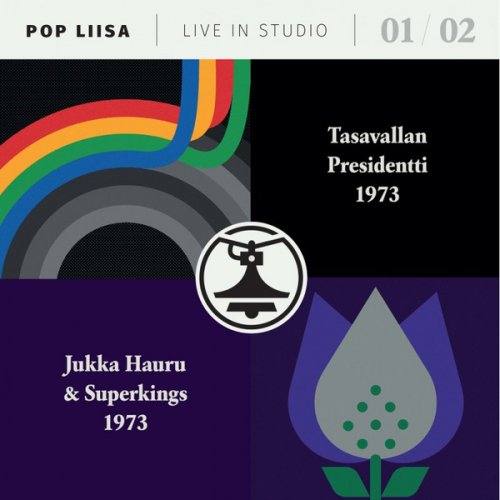
![Jay Cinema - A Smile to a Tear (2025) [Hi-Res] Jay Cinema - A Smile to a Tear (2025) [Hi-Res]](https://img.israbox.com/img/2026-02/15/3den0r6ij0gj805kc59em92op.jpg)
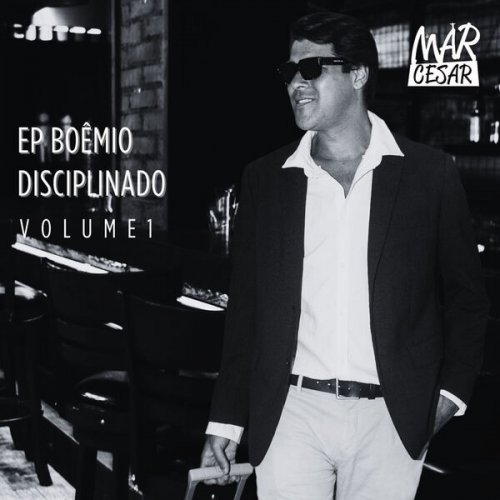
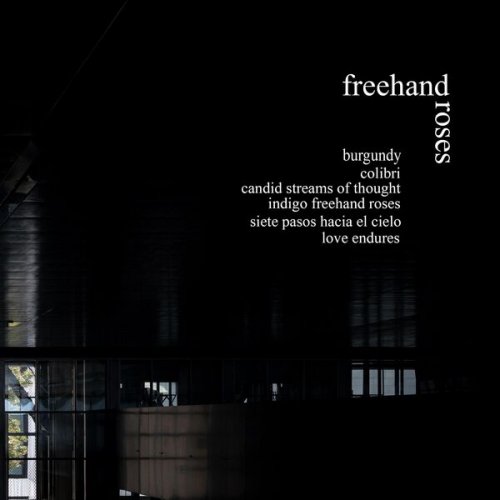
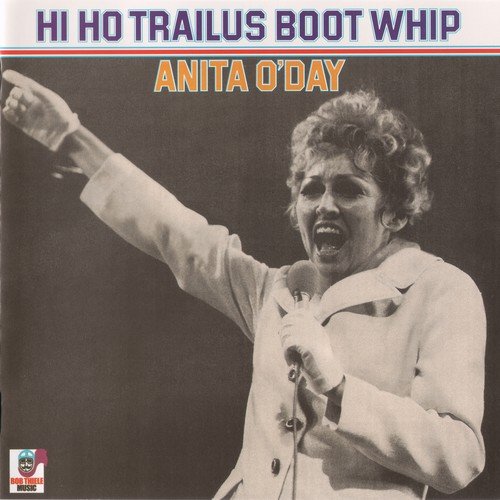
![Gregory Lewis & Ms. Raina - Organ Monk Sings (Introducing Ms. Raina) (2026) [Hi-Res] Gregory Lewis & Ms. Raina - Organ Monk Sings (Introducing Ms. Raina) (2026) [Hi-Res]](https://www.dibpic.com/uploads/posts/2026-02/1770839809_owtxytnszg5nv_600.jpg)
